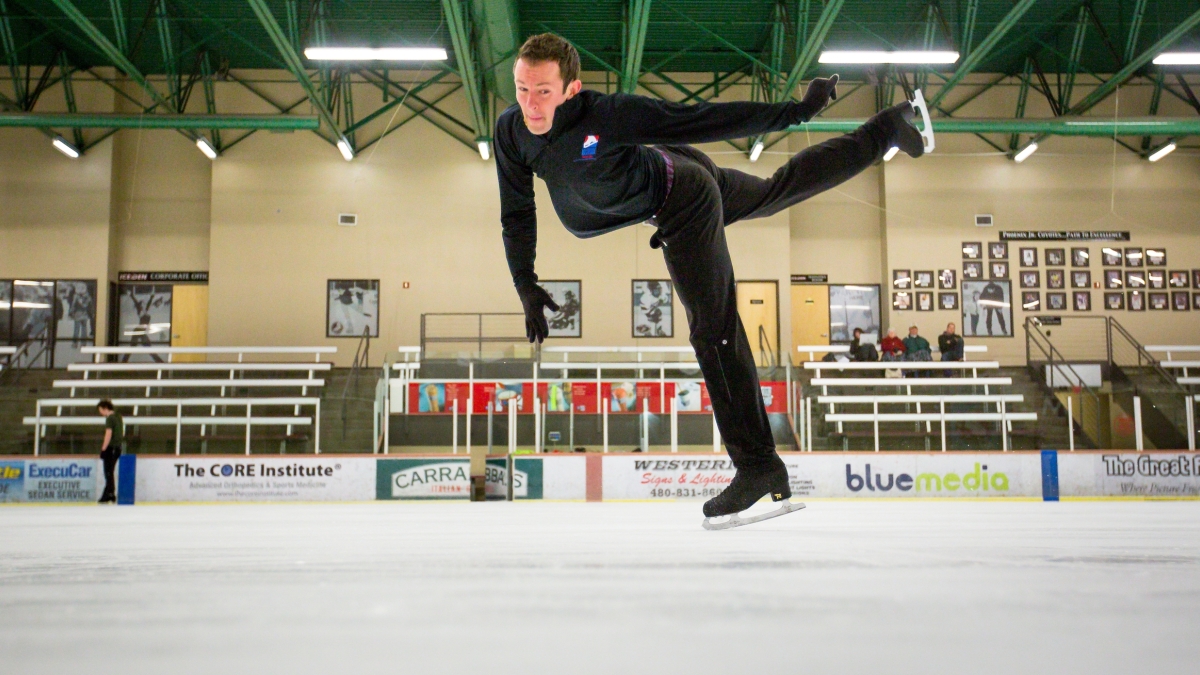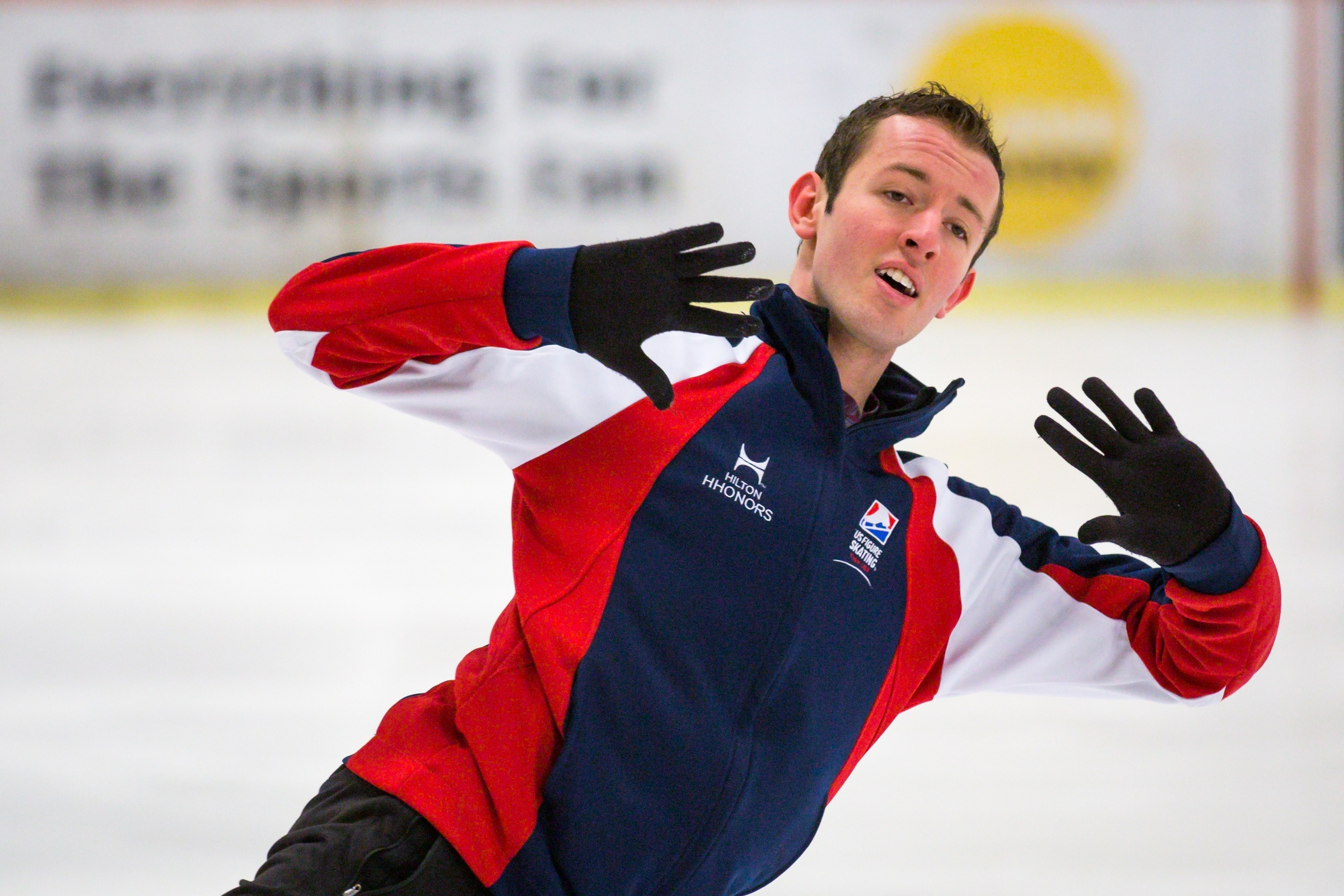When Daniel Kulenkamp steps onto the ice and begins to glide across the frosty rink, he leaves Arizona State University behind.
In those moments, he's focused on grinding out jumps and perfecting graceful spins. After he's done, Kulenkamp removes his skates and returns to the responsibilities that come with being a student in Barrett, the Honors College.
The 20-year-old is pursuing his dream of being a championship figure skater while also studying full time.
That requires a balancing act as fine as the edge of his skate blade.
“We always say that when you get to the rink you want to check it at the door, skate and pick it back up when you leave,” he said of the outside world beyond skating.
Kulenkamp gets to the rink every morning Mondays through Fridays, where he trains for at least two and half hours. Off the ice, he works on weights and conditioning, including plyometrics, at least an hour a day.
At ASU, where he’s majoring in computer science during his first year at the university, Kulenkamp took 16 credits in the fall semester, half of them online.
He also coaches a youth hockey team and gives private skating lessons.
“I’ve always been somewhat of an overachiever,” Kulenkamp said. “But I’m not saying it’s an easy thing to do.”
Sometimes, it’s almost impossible.
“There was one day where I didn’t score quite as well on an exam as I had hoped for and it carried over into the rink the next day, but for the most part, I’m pretty good about keeping everything separate,” he said.
Daniel Kulenkamp skates two and half hours a day, five days a week at the Ice Den rink in Scottsdale. Photos by Charlie Leight/ASU Now
With fall semester over, Kulenkamp is now concentrating on perfecting his short and long programs for the 2016 Prudential U.S. Figure Skating Championships in January.
He’s one of several skaters from the Coyotes Skating Club, based at the Ice Den in Scottsdale, to qualify for the national championships.
Kulenkamp came in eighth place at the nationals last January in the junior division. He has since moved up to the senior men’s level and added a triple axel jump — one of the most difficult moves.
“My ultimate goal is to place in the top 12 at nationals, but I try not to think about that because then you get caught up in the placements,” he said. “I want to skate as cleanly and as well as I can.”
The competition in January will be especially meaningful to him because it’s in his hometown of St. Paul, Minnesota. The Kulenkamp family moved to Scottsdale earlier this year so Daniel, and his 17-year-old brother Grant, also a figure skater, could train at the Ice Den and so Daniel could attend ASU.
“Barrett was a big factor because I wanted a more challenging school, and Barrett supplies that along with the big research university that I wanted,” said Kulenkamp, who went to an online high school for two years and then accumulated more than 50 credits at the University of Minnesota through dual-enrollment classes.
His coaches have been supportive.
“They know that was part of the decision moving here — that I was going to go to school,” he said.
Doug LadretDoug Ladret, a two-time Olympian and Canadian pairs skating champion, is the Ice Den's director of figure skating development., one of Kulenkamp's coaches at the Ice Den, said that time management is a crucial part of the sport.
"You can't always choose when you train. You have to train when the ice is available. They have to train around school and that happens from the time they start skating, in elementary school and middle school," he said.
"Coaches know that. We all did it too."
Kulenkamp is working toward making the U.S. National Team for the 2018 Winter Olympics in South Korea. He knows he will need to add at least one quadruple jump to his program for that.
“Seniors have more difficult jumps and longer programs, but it also has more to do with artistic ability and the power that you have while you’re skating,” he said.
“Plus there are bigger crowds.”
Kulenkamp has already worked his spring semester classes around his training schedule, but competitions are always tricky. He’ll miss the first day of classes while he’s at nationals in Minnesota.
As a Barrett student, he’s required to take the program’s signature “Human Event” course, where absences are limited.
“I’m extremely cautious to plan my trips around those classes,” he said.
Maintaining that balance is the key.
“I really want to get the degree, but I also want to see where skating takes me.”
More Arts, humanities and education

ASU professor's project helps students learn complex topics
One of Arizona State University’s top professors is using her signature research project to improve how college students learn science, technology, engineering, math and medicine.Micki Chi, who is a…

Award-winning playwright shares her scriptwriting process with ASU students
Actions speak louder than words. That’s why award-winning playwright Y York is workshopping her latest play, "Becoming Awesome," with actors at Arizona State University this week. “I want…

Exceeding great expectations in downtown Mesa
Anyone visiting downtown Mesa over the past couple of years has a lot to rave about: The bevy of restaurants, unique local shops, entertainment venues and inviting spaces that beg for attention from…



